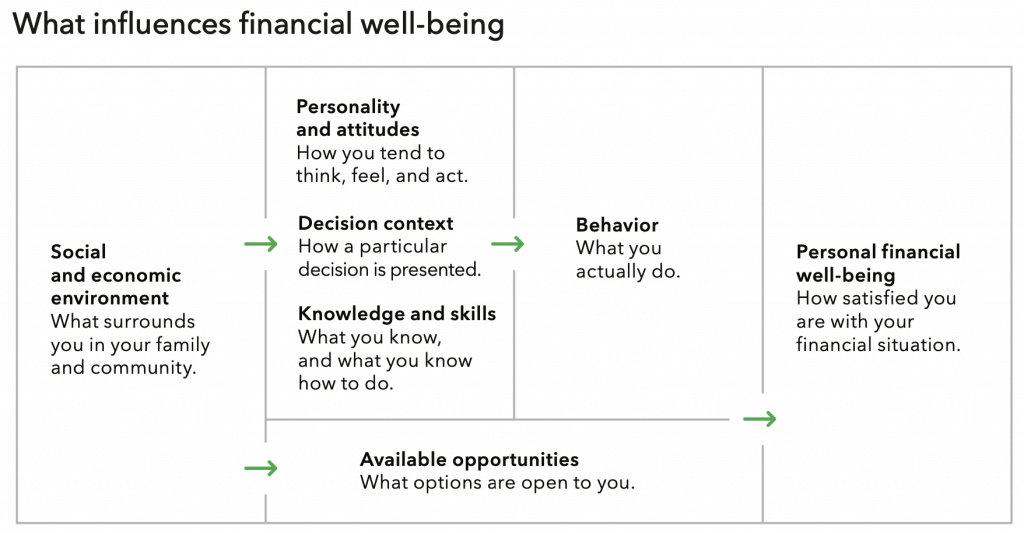
Covid-19 has made personal financial worries the top source of employee stress. But while the deleterious effects on low mental wellbeing are well documented, financial stress has been less appreciated for its ability to harm not only employee mental health, but also affect employer profits.
Low financial wellbeing was a problem before Covid-19, and it’s more than just a personal problem. Financial stress profoundly impacts employers by lowering workplace productivity, diminishing employee health and customer service, and is a driving force for an impending mental health crisis.
Personal Finances and Mental Health
According to The Consumer Financial Protection Bureau (CFPB), financial wellbeing centers on our perceptions of “financial security” and “financial freedom of choice,” both in the present and in the future, including:
- Control over the day-to-day, month-to-month finances
- Financial freedom to make choices to enjoy life
- Capacity to absorb a financial shock
- On track to meet your financial goals
And now, more and more employees are stressed about their personal finances, falling short of the four-point definition above.
A Capital One study, for example, found that finances are the top stressor for 73% of Americans. And the American Psychological Association’s latest Stress in America survey found that nearly 2 in 3 adults (64%) say that money is a significant source of stress, with (52%) saying they’ve experienced negative financial impacts due to the pandemic.
Financial stress is affecting both lower paid and higher-paid workers, with 73% people with household incomes of less than $50K reported that money is a significant source of stress, while 59% of those with a household income of $50K+ say the same, according to the APA study.
How does this affect employers?
First, and most significantly, there’s workplace performance. When personal financial security is under assault, many employees feel overwhelmed by financial stress, especially those living paycheck to paycheck of which there are many.
As a result, employees with financial stress don’t bring their best selves to work. Even before Covid-19, the 8th Annual Employee Financial Wellness Survey, found that thirty-five percent of employees said personal financial issues distracted them at work for three or more hours a week.
Studies show that financial struggles strain cognitive abilities, which can lead to poor decision-making, something that can impact job performance.
Another study found that constant financial struggles lower IQ (intelligence quotient) by up to 13 IQ points. This is because personal financial struggles erode brainpower that could be devoted to other areas of life, which makes them more likely to make mistakes and bad decisions.
Thus, financial stress contributes to poor mental health, which in turn impacts workplace performance. And because low mental wellbeing can lead to substance abuse, chronic illness, and depression, employers need to help employees feel more secure about their financial present and future.
How Employers Can Help
Employers must understand the foundational role and mental processes around financial wellbeing that contribute to overall wellbeing.
In 2017, a Journal of Consumer Research study found that financial narratives about our “perceived financial wellbeing” help us conceptualize (for better or worse) how we perceive and react to money-related issues today, and how we perceive our personal security about financial futures.
Notably, the study found that how people perceive their financial wellbeing affects their overall wellbeing. In fact, perceptions about personal financial wellbeing were comparable with the combined effects of other considerations like job satisfaction, physical health, and satisfaction with personal relationships.
Given that our perceptions about our financial present and future are key to avoiding financial stress, employers should focus on helping employees shift their perceptions from “stress and fear” to a promise of “financial security” and “financial freedom of choice,” in the present and in the future.
Meeting Financial Challenges
Another study by CFPB found that people perceive their own financial wellbeing via a predictable process. They react to their current social and economic environments using existing attitudes and knowledge about finances, which then determine how they respond to financial challenges.

Source: Consumer Financial Protection Bureau
This demonstrates that financial wellbeing is the result of how we perceive current challenges, and how we’re equipped to make decisions to secure a better financial future.
Accordingly, employers should develop initiatives that provide resources and programs that help employees understand and act on their economic situations, while also providing “Available Opportunities” to help employees achieve current and future financial security and wellbeing.
Boost Pay & Benefits
Low-paid workers suffer from living paycheck to paycheck and struggle to make ends meet. Their stress is unrelenting, and many have negative perceptions about their financial present and future which takes a serious toll on their mental health and work performance.
Employers need to evaluate employee pay and benefits to ensure everyone is making at least a living wage. Research shows that it actually costs more to pay less than a living wage, because that actually lowers employee performance and business results.
Zeynep Ton’s book, The Good Jobs Strategy, shows how companies that pay employees living wages, provide good benefits and create employee-focused workplace cultures, outperform competitors that pay less.
For companies that simply cannot raise wages, particularly now during Covid, it’s about helping employees achieve more purchasing power or keep more money in their pockets by using company scale and resources.
Financial Literacy
Too many employees don’t understand the basics of good money management. Partner with a credit union or financial education program and offer money management classes and financial councilors to help employees adapt to their current realities with better day-to-day money management.
Programs should help employees learn to live within their financial means (if possible), avoid overspending, establish emergency funds, and negotiate with creditors. This helps employees overcome stress and shape a realistic vision for their long term financial wellbeing.
Side Hustles and Entrepreneurship
Many employees will be forced to start side businesses to make ends meet. Employers should encourage and support entrepreneurship for workers who are not working full-time or making sufficient wages and benefits to constitute a living wage.
Studies in the UK have found that when employers support employee entrepreneurship, they enjoy many benefits, including:
- 49% of employers say it helps them retain their best people
- 50% say it helped them attract top talent
Employers should develop formal policies to guide this process and talk with employees about their business activities outside of work. If employers can be flexible, and assuming a side hustle does not compromise performance, it can help employees get the money they need and lower their financial stress.
Boost Buying Power
Anything employers can do to help employees keep more money in their pockets will help them lower their financial stress.
Consider joining (or forming) a discount purchasing program that provides employee discounts on commonly purchased items or household expenses. Or, partner with other businesses and negotiate employee discounts with restaurants, dentists, gyms, or other local retailers.
Consider other innovative benefits like pet insurance, childcare assistance, subsidized commuting programs, and the like that can cost little but help employees achieve better financial peace of mind.
Build Safety Nets
A top near-term concern for employees is being unable to meet emergencies, with studies showing that lacking emergency savings as a top source of high stress and low financial wellbeing.
To ease this serious emotional burden, employers should offer paycheck advances to employees in need, and consider forming emergency grant or loan funds to help employees handle emergencies. Or work with Neighborhood Trust, a nonprofit that provides financial counseling and helps employees in need find public resources.
Focus On The Future
These are some ways to help employees ease their financial stress, build positive perceptions about their near and long-term financial wellbeing, and help avoid the insidious effects of financial stress on their mental wellbeing and their employers’ bottom lines.
Low employee financial wellbeing can lead to costly mental health challenges for workplaces and society at large. We can no longer ignore the inextricable link between low financial wellbeing and poor mental health which is central to employee health and workplace performance.
It is both good business and the right thing to do for employers to take responsibility for helping employees avoid financial desperation or anxiety, feel financially empowered, and cultivate a positive vision for their financial futures.

